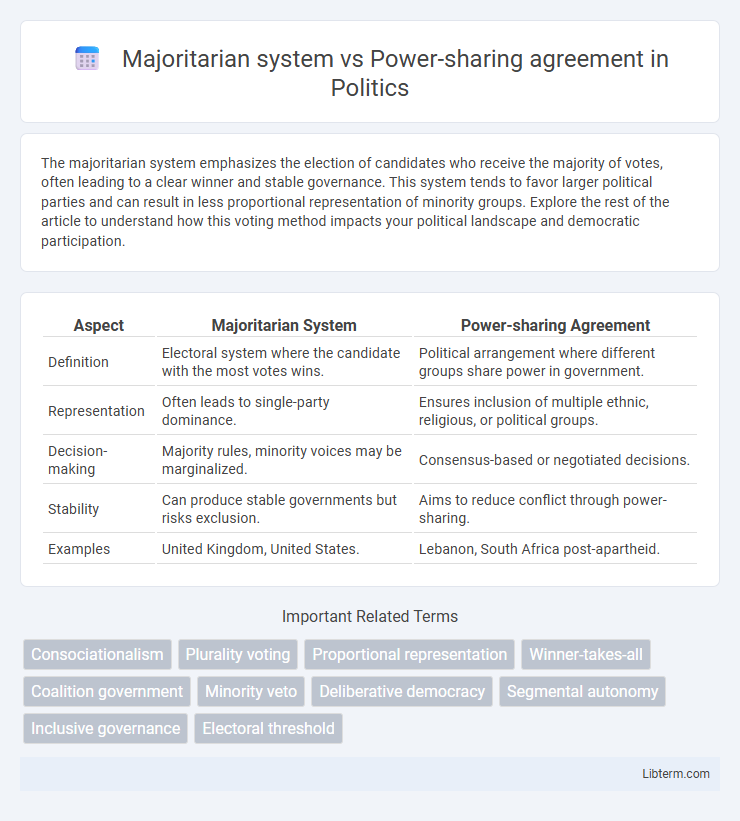The majoritarian system emphasizes the election of candidates who receive the majority of votes, often leading to a clear winner and stable governance. This system tends to favor larger political parties and can result in less proportional representation of minority groups. Explore the rest of the article to understand how this voting method impacts your political landscape and democratic participation.
Table of Comparison
| Aspect | Majoritarian System | Power-sharing Agreement |
|---|---|---|
| Definition | Electoral system where the candidate with the most votes wins. | Political arrangement where different groups share power in government. |
| Representation | Often leads to single-party dominance. | Ensures inclusion of multiple ethnic, religious, or political groups. |
| Decision-making | Majority rules, minority voices may be marginalized. | Consensus-based or negotiated decisions. |
| Stability | Can produce stable governments but risks exclusion. | Aims to reduce conflict through power-sharing. |
| Examples | United Kingdom, United States. | Lebanon, South Africa post-apartheid. |
Introduction to Majoritarian and Power-Sharing Systems
Majoritarian systems concentrate political power in the hands of the majority, often reducing representation for minorities by awarding seats to the largest vote-getters, leading to a winner-takes-all outcome. Power-sharing agreements emphasize inclusive governance by distributing authority among diverse groups, ensuring minority participation and reducing conflict through mechanisms like coalitions and proportional representation. These contrasting frameworks shape political stability and representation in multicultural societies by balancing majority rule with inclusivity.
Defining Majoritarian System
The majoritarian system is a political framework where the majority group holds predominant power, often resulting in governance by a single party or coalition that wins the most votes. This system emphasizes the principle of majority rule, frequently sidelining minority groups and their interests in decision-making processes. Unlike power-sharing agreements that allocate authority among diverse groups to ensure inclusivity and stability, majoritarianism focuses on clear electoral victories to form government.
Key Features of Power-Sharing Agreements
Power-sharing agreements emphasize inclusive governance by distributing political power among various ethnic, religious, or social groups to ensure representation and prevent dominance by a single entity. Key features include coalition governments, proportional representation, mutual veto rights, and decentralization of authority, which collectively foster cooperation and conflict resolution in divided societies. These mechanisms aim to maintain stability and promote equitable participation in decision-making processes, contrasting the winner-takes-all nature of majoritarian systems.
Historical Context and Evolution
The majoritarian system, rooted in early democratic practices, emphasizes single-party dominance based on majority rule, historically evolving from British parliamentary models where the largest party governs exclusively. Power-sharing agreements emerged in multi-ethnic and post-conflict societies as a response to ethnic divisions and political instability, notably exemplified by the consociational arrangements in Lebanon and later in Northern Ireland and South Africa. These systems evolved to promote inclusive governance and prevent conflict by distributing power among diverse groups, contrasting with the exclusionary tendencies of majoritarian rule.
Comparative Structural Differences
The majoritarian system centralizes political power by awarding authority to the party or candidate with the most votes, often resulting in single-party dominance and clear decision-making processes. Power-sharing agreements distribute authority among multiple parties or groups, fostering inclusive governance through coalition-building and consensus mechanisms to represent diverse interests. Structurally, majoritarian systems emphasize winner-takes-all outcomes, while power-sharing agreements institutionalize cooperative frameworks to balance representation and prevent exclusion.
Advantages of Majoritarian Systems
Majoritarian systems promote decisive governance by ensuring the winning party or candidate holds a clear majority, leading to political stability and efficient decision-making. They simplify voter choice and enhance accountability, as elected representatives directly reflect the electorate's preferences. These systems often reduce political fragmentation by discouraging the proliferation of small parties, fostering clearer policy agendas.
Benefits of Power-Sharing Arrangements
Power-sharing arrangements enhance political stability by ensuring inclusive representation of diverse ethnic, religious, or political groups, reducing the risk of marginalization and conflict. These agreements promote collaborative governance and foster consensus-building, which strengthens democratic institutions and encourages dialogue among competing interests. By distributing power more equitably, power-sharing systems help protect minority rights and contribute to long-term peace and social cohesion in divided societies.
Common Challenges and Criticisms
Majoritarian systems often face criticisms for marginalizing minority groups and fostering polarized politics, which can lead to social exclusion and instability. Power-sharing agreements, while aiming to promote inclusivity and cooperation, commonly encounter challenges such as political gridlock, lack of clear accountability, and difficulties in decision-making due to competing interests among diverse factions. Both systems struggle with balancing representation and effective governance, often requiring tailored institutional frameworks to address their inherent limitations.
Case Studies: Examples Around the World
The majoritarian system, exemplified by the United Kingdom, fosters stable single-party governments but often marginalizes minority groups, as seen in the Brexit debates where winners took all. In contrast, power-sharing agreements like those in South Africa's post-apartheid government ensure representation across ethnic lines, promoting social cohesion through inclusive governance. Lebanon's consociational model illustrates power-sharing's role in maintaining peace among diverse religious communities, though it sometimes results in political gridlock.
Conclusion: Assessing Democratic Outcomes
Majoritarian systems often produce clear electoral winners, enabling decisive governance but risking exclusion of minority voices and fostering polarization. Power-sharing agreements promote inclusivity and represent diverse interests, enhancing political stability and social cohesion in divided societies. Evaluating democratic outcomes requires balancing effective decision-making with broad representation to ensure legitimacy and long-term peace.
Majoritarian system Infographic

 libterm.com
libterm.com